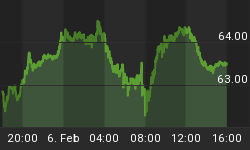It is hard to be the top dog.
Today, despite another low-volume session (incredibly, NYSE Composite volume is already 1.5 billion shares behind 2012's volume-to-date), investors were looking forward to a slew of earnings announcements. By and large, companies hit or exceeded the hurdles set for them, as they typically do.
Apple (AAPL), which released fiscal Q1 earnings after the close, was among those that exceeded expectations. Sales rose 18%, although falling marginally short of expectations, and the company posted a $13.81/share profit compared with expectations for $13.53/share. Apple guided Q2 revenue estimates downward, and the stock was pummeled more than 6% after the close.
What's amazing to me is that investors were not satisfied. Bloomberg gaped that "Apple Inc. posted no profit growth and the slowest increase in sales in 14 quarters..." This is a very large company. How long did people think that the firm could grow at "only" 18%? The same story also suggested the reason for the disappointing reaction: "The results reinforce concern that Apple's growth is being hurt by higher production costs..."
No, its growth is being hurt because it's a very large company.
Now, Apple is a wonderful, wonderful company. I want to be like Apple. I want my daughter to marry someone like Apple. It only has an 11.7 trailing P/E, and a yield of 2.06%. There's much to like. But it's huge. Like Microsoft before it, it is going to transition to a period of large-industrial-concern growth (MSFT has a 10.7 multiple and a 3.33% yield). The difference between MSFT and AAPL is that the former has an almost unassailable position in some of its markets. The latter, while a very cool company, has unassailable positions in ... perhaps the iPod, to the extent that market isn't cannibalized by the smartphone market. On the other hand, MSFT is a ruthless, uncreative company that has historically put out buggy products (although version 275 of Excel seems to crash less). AAPL is an ultra-cool, creative company that is in 'what have you done for me lately' product markets. I am not saying that I would do a long-short on MSFT-AAPL, and I'm not even saying that AAPL needs to trade lower from these levels. I'm merely pointing out that the dividend growth model contemplates a transition to lower long-run growth, and AAPL is going to have lower long-term growth eventually. That shouldn't be surprising. Its main problem as an investment was that it was far too expensive for a company in transition, and moreover that transition was almost assured once it became such a huge company. Gravity isn't just a good idea, Icarus: it's the law.
The good news is that if AAPL is on its way to becoming IBM (without the gray-costumed drones of the 1984 advertisements, of course), it may have fallen far enough. IBM trades at a 13.4 P/E and a 1.66% dividend yield. Even Icarus bounced once he'd fallen for a while.
.
Thursday's main economic data will be Initial Claims (Consensus: 355k from 335k). It is getting late enough in January that it is starting to make sense to pay attention to Claims again; however, as always with a weekly figure it will take a few weeks to let the average settle out.
More important, to me, is the auction of the new 10-year TIPS. This is not a re-opening, but rather a January-2023 maturity. The Treasury will be auctioning $15bln of the security, and I believe the auction will go well. The WI is pricing at roughly a 10-11bp pick-up from the current 10-year. That looks like too much, and I would expect that investors who own the current 10-year TIPS would be eager to add 11bps for six months of maturity (and pick up a slightly closer-to-the-money deflation floor in the process). Add to this the fact that the 10-year sector is fairly cheap on the curve generally, and you have the ingredients for a pretty good auction even if the absolute levels of yield are heinous and the breakevens are relatively wide by recent standards.















